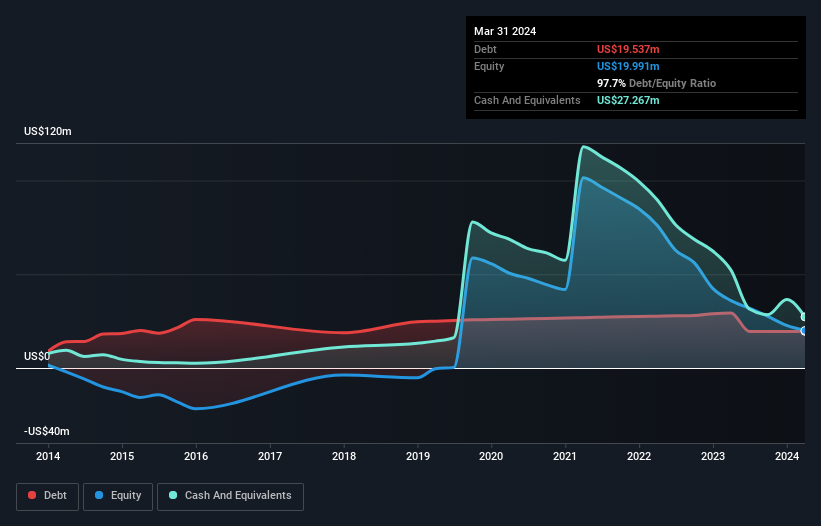The external fund manager backed by Berkshire Hathaway's Charlie Munger, Li Lu, makes no bones about it when he says 'The biggest investment risk is not the volatility of prices, but whether you will suffer a permanent loss of capital.' So it might be obvious that you need to consider debt, when you think about how risky any given stock is, because too much debt can sink a company. We note that Exagen Inc. (NASDAQ:XGN) does have debt on its balance sheet. But is this debt a concern to shareholders?
What Risk Does Debt Bring?
Generally speaking, debt only becomes a real problem when a company can't easily pay it off, either by raising capital or with its own cash flow. In the worst case scenario, a company can go bankrupt if it cannot pay its creditors. While that is not too common, we often do see indebted companies permanently diluting shareholders because lenders force them to raise capital at a distressed price. By replacing dilution, though, debt can be an extremely good tool for businesses that need capital to invest in growth at high rates of return. The first thing to do when considering how much debt a business uses is to look at its cash and debt together.
View our latest analysis for Exagen
How Much Debt Does Exagen Carry?
The image below, which you can click on for greater detail, shows that Exagen had debt of US$19.5m at the end of March 2024, a reduction from US$29.3m over a year. However, its balance sheet shows it holds US$27.3m in cash, so it actually has US$7.73m net cash.

A Look At Exagen's Liabilities
According to the last reported balance sheet, Exagen had liabilities of US$8.78m due within 12 months, and liabilities of US$22.0m due beyond 12 months. Offsetting these obligations, it had cash of US$27.3m as well as receivables valued at US$10.9m due within 12 months. So it actually has US$7.35m more liquid assets than total liabilities.
This excess liquidity suggests that Exagen is taking a careful approach to debt. Due to its strong net asset position, it is not likely to face issues with its lenders. Simply put, the fact that Exagen has more cash than debt is arguably a good indication that it can manage its debt safely. The balance sheet is clearly the area to focus on when you are analysing debt. But it is future earnings, more than anything, that will determine Exagen's ability to maintain a healthy balance sheet going forward. So if you want to see what the professionals think, you might find this free report on analyst profit forecasts to be interesting.
Over 12 months, Exagen reported revenue of US$56m, which is a gain of 20%, although it did not report any earnings before interest and tax. With any luck the company will be able to grow its way to profitability.
So How Risky Is Exagen?
We have no doubt that loss making companies are, in general, riskier than profitable ones. And we do note that Exagen had an earnings before interest and tax (EBIT) loss, over the last year. And over the same period it saw negative free cash outflow of US$14m and booked a US$19m accounting loss. However, it has net cash of US$7.73m, so it has a bit of time before it will need more capital. Exagen's revenue growth shone bright over the last year, so it may well be in a position to turn a profit in due course. By investing before those profits, shareholders take on more risk in the hope of bigger rewards. The balance sheet is clearly the area to focus on when you are analysing debt. However, not all investment risk resides within the balance sheet - far from it. These risks can be hard to spot. Every company has them, and we've spotted 4 warning signs for Exagen you should know about.
If you're interested in investing in businesses that can grow profits without the burden of debt, then check out this free list of growing businesses that have net cash on the balance sheet.
Valuation is complex, but we're here to simplify it.
Discover if Exagen might be undervalued or overvalued with our detailed analysis, featuring fair value estimates, potential risks, dividends, insider trades, and its financial condition.
Access Free AnalysisHave feedback on this article? Concerned about the content? Get in touch with us directly. Alternatively, email editorial-team (at) simplywallst.com.
This article by Simply Wall St is general in nature. We provide commentary based on historical data and analyst forecasts only using an unbiased methodology and our articles are not intended to be financial advice. It does not constitute a recommendation to buy or sell any stock, and does not take account of your objectives, or your financial situation. We aim to bring you long-term focused analysis driven by fundamental data. Note that our analysis may not factor in the latest price-sensitive company announcements or qualitative material. Simply Wall St has no position in any stocks mentioned.
About NasdaqGM:XGN
Exagen
Designs, develops, and commercializes various testing products under the AVISE brand in the United States.
Undervalued with adequate balance sheet.
Similar Companies
Market Insights
Community Narratives




